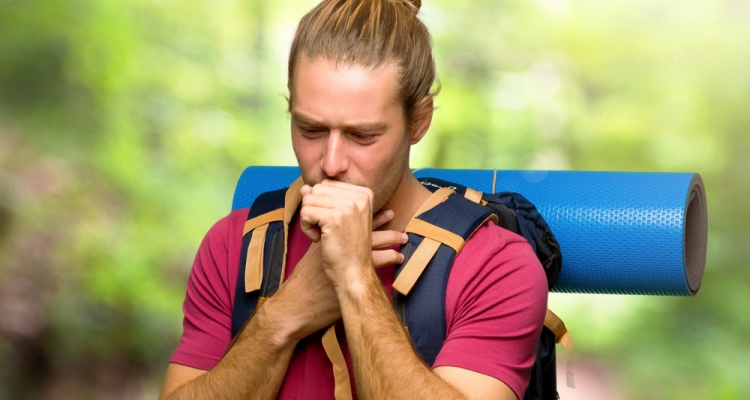“Take a deep breath and count to three.” A common remedy you’ll hear people say, that’s used to help you relax those travel tensions before you board a flight. Sounds easy enough, right? Well, if you’re one of the 25 million Americans who suffer from asthma, that deep breath might not be all that easy to take.
While finding cheap international flights and masterminding the perfect itinerary might seem like a breeze, if you’re traveling with asthma, the extra care needed in prepping, planning, and packing for your trip might just throw you in for a loop. But don’t let your asthma get in the way of your travel dreams. Use our simple tips on traveling with asthma so you can have a great trip and breathe easy abroad.
1..2..3… go ahead – take that deep breath and get ready for takeoff!
Schedule a Checkup with Your Physician
As for anyone going abroad with a medical condition, if you’re traveling with asthma, your travel prep should start with a visit to your general physician (GP). Aside from the obvious parts of a checkup (like letting you know if you’re physically fit for travel and making sure you have enough of your prescription medication to last you through your trip), your GP can also help you identify your triggers and warn you of any potential triggers to watch out for. While you’re there, be sure to ask your doctor to help you make an Asthma Action Plan (action plan for asthma emergencies). This way, you know how to prepare for your upcoming travels and exactly what to do if your asthma worsens.
Skip the Booze
You’re cleared by the doctor to travel by air with your asthma – awesome! But before you start pouring the champagne to celebrate once you’re onboard, take a second to assess if maybe you should opt for some seltzer for your bubbly toast. Inside your aircraft cabin, it can be quite dry, so dehydration is natural for all sorts of passengers. For asthmatics, it’s especially risky to drink on long flights, as alcohol consumption only increases your dehydration (yikes!), so try sticking to water and other caffeine-free soft beverages. You know your body and what your triggers are. So, before you get that glass of Merlot, check in with yourself and see if it’s a good idea.
PRO-TIP: If you’re asthmatic and also have different allergies, take some wipes with you to wipe down your seat and tray tables. More importantly, BYOB (bring your own blanket, that is). You never know what kind of dust or dander might be left behind by previous passengers!
Research Your Destination
“What’s the weather like over there?” may seem like just a question you ask to make awkward small talk, but when it comes to your asthma-health abroad, it’s the most important question to ask yourself. If you’re traveling with asthma, many of the triggers you’ll encounter on your trip will be environmental, so things like extreme changes in temperature, altitude differences, dust, smoke, and pollen are just a few things to look out for. With just a little due diligence, you’ll know what to expect and can be prepared for whatever mother nature and the surrounding environment have in store for you at your destination.
In the case of an emergency abroad, it’s always good to locate and note the closest medical facilities to where you’re staying. If you have severe, or even just easily-triggered asthma, the last thing you want is to have to desperately search for a healthcare facility. Do a deep-dive into the area that you’re staying in, and find out where the closest clinics, hospitals, and pharmacies are, so that when/if you’re in need of urgent medical care in the midst of an attack or even just need a refill on an inhaler or other medicines, you know exactly where to go and how to find what you’re looking for.
You may also like: How to Deal with an Emergency Abroad
Pack an Asthma Travel Kit
From nightly pills to nebulizers, spacers to peak flow meters, and antihistamines to inhalers, make a list of everything (and then some) asthma-related that you need… and then pack them. Even if you’ve packed enough of your prescription drugs away in your suitcase to last you through your trip, it’s always important to have back-ups. Your asthma travel kit should be like an on-the-go pack that you can keep on you at all times. In it, be sure to pack small-sized versions of all your regular medications (i.e. portable nebulizers and smaller pill packs), a mask for times you may need to reduce your exposure to contagious illnesses or irritants that can trigger your asthma and a copy of your Asthma Action Plan. This kit will not only be handy to carry on your day-to-day adventures, but it’ll also be a life-saver in case your luggage gets lost or you run out of the medications you need.
Don’t Forget Your Asthma Action Plan
Like any other medical condition, traveling with asthma means you’ll need a way to help others help you in case your health takes a turn for the worse. Cue in Asthma Action Plan. An Asthma Action Plan (AAA) is a written plan of action that provides both information and instructions on what to do when your asthma flares up. Your plan should include: the medicines you need and are on, a list of symptoms to identify when you might sense an asthma attack coming, and what to do in emergency situations to help you get your asthma back under control. Make a copy of your plan and carry it with you at all times so that it’s readily available when you’re seeking medical assistance abroad. If you’re traveling with others, make copies for them to carry as well, this way, in case you don’t have your own copy, at least one person in the group will have it handy at all times, and this also ensures that your travel buddies are aware of what to look out for and know how to help you immediately.
Book the Right Accommodation
You’ve found the best cheap international flights, landed a bargain on a hotel, and even managed to nab a deal on car rentals. Great! But before you hit the ‘book’ button on your accommodation, call up the hotel, and find out the details of the rooms available at your stay. Is it non-smoking? Is it pet-friendly? Does it have a daily cleaning service? Small things like animal dander, dust mites, or a room that allows smoking are common to many hotels and home rentals. Find out as many details as you can ahead of time so you can prepare accordingly and don’t end up having to stay somewhere that could make you sick! Most importantly, don’t forget to check the reviews of where you’ll be staying, as many travelers are eager to share their experiences, especially if they experience medical conditions like asthma. You’ll also want to look out for a non-smoking hotel that has a clean-air endorsement.
Additionally, if your asthma is largely due to allergies, it’s highly recommended that you stay on the top floor, or as high up as you can. The closer you are to the ground, the more likely it is to be surrounded by pollen or other allergens. On the top floor, however, the pollen count is much lower. If you aren’t able to get that coveted room all the way up top, try to ask for another room as far away from the entrance to the hotel as possible. But, don’t forget to ask way in advance!
Don’t Overdo It

We know, we know. That hike to the top of the mountain, the bike ride across the countryside, and that swim across the cenote for those Instagram-worthy pictures are all you’ve been looking forward to. But remember that exercise and long periods of exertion can trigger your asthma. Of course, you should make the best of your time abroad, but if you’re traveling with asthma and plan on being highly active on your trip, be sure to take the proper precautions. If you’re not much of a hiker or biker back home, but want to jet-set on an adventure of a lifetime, start preparing your body well ahead of time for what’s to come and talk to your doctor to make sure it’s safe for you to take part in the activities you want to do. Don’t hesitate to take breaks often, slow down when you need to, or even opt out of activities that you think might make you unwell or strain your lungs too much. The most important thing to remember is to stay safe and healthy, so make sure you know your limits and try not to overdo it!
Have any tips for traveling with asthma to add to the list? Let us know in the comments below!




